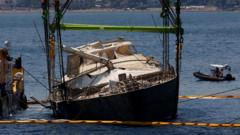Tensions are escalating in the Yellow Sea as South Korea expresses strong concerns over China's recent installations, which Beijing claims are fish farms. The South Korean government has formally protested these structures, suspecting they may serve dual purposes, potentially enhancing China’s military presence in the region. The controversy has emerged on the heels of a report from the Washington-based Center for Strategic and International Studies, which suggests these platforms might already be collecting sensitive data. As South Korea navigates diplomatic relations with China, the situation poses a significant challenge for President Lee Jae Myung's administration.
China's Claims of Fish Farms in the Yellow Sea Raise Alarm in South Korea

China's Claims of Fish Farms in the Yellow Sea Raise Alarm in South Korea
Concerns grow in South Korea over China's use of steel structures in disputed waters, fearing military applications behind the facade of aquaculture.
In recent years, China has placed substantial structures in the Yellow Sea, including a decommissioned oil rig and large steel cages, claiming they are intended for aquaculture. However, these assertions have raised alarms in South Korea, where officials and military veterans view them as possible military apparatus rather than mere fish farms. The South Korean National Assembly recently adopted a resolution condemning the installations, labeling them as “a threat to maritime safety.”
According to a report by the Center for Strategic and International Studies, while the seas are claimed to support aquaculture, the installations may possess dual-use capabilities. The report analyzed satellite imagery to assess that even without expansions, the structures could be gathering vital data useful for navigation and detection in the underwater realm. Such developments evoke apprehensions sharp as there are parallels with China's contentious expansions in the South China Sea, where civilian constructs were converted to military outposts.
The rising tensions regarding these Chinese structures in the Yellow Sea have quickly emerged as a pressing issue for newly inaugurated President Lee Jae Myung, who began his term pledging to enhance relations with China while fortifying alliances with the United States. Mr. Lee is seeking a meeting with Chinese President Xi Jinping at the upcoming Asia-Pacific Economic Cooperation summit in Gyeongju, South Korea, in November. However, the controversy surrounding these maritime installations may test his diplomatic endeavors going forward.
According to a report by the Center for Strategic and International Studies, while the seas are claimed to support aquaculture, the installations may possess dual-use capabilities. The report analyzed satellite imagery to assess that even without expansions, the structures could be gathering vital data useful for navigation and detection in the underwater realm. Such developments evoke apprehensions sharp as there are parallels with China's contentious expansions in the South China Sea, where civilian constructs were converted to military outposts.
The rising tensions regarding these Chinese structures in the Yellow Sea have quickly emerged as a pressing issue for newly inaugurated President Lee Jae Myung, who began his term pledging to enhance relations with China while fortifying alliances with the United States. Mr. Lee is seeking a meeting with Chinese President Xi Jinping at the upcoming Asia-Pacific Economic Cooperation summit in Gyeongju, South Korea, in November. However, the controversy surrounding these maritime installations may test his diplomatic endeavors going forward.





















